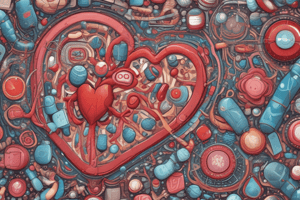Podcast
Questions and Answers
Which class of drugs includes Furosemide?
Which class of drugs includes Furosemide?
- Diuretics (correct)
- Beta-blockers
- ACE inhibitors
- Angiotensin II receptor blockers
What is the primary use of Lisinopril?
What is the primary use of Lisinopril?
- To manage diabetes
- To alleviate pain
- To reduce blood pressure (correct)
- To treat anxiety disorders
Which of the following drugs is classified as a Renin inhibitor?
Which of the following drugs is classified as a Renin inhibitor?
- Benazepril
- Aliskiren (correct)
- Eplerenone
- Irbesartan
Which of the following is an example of a beta-blocker?
Which of the following is an example of a beta-blocker?
What defines hypertension according to the provided content?
What defines hypertension according to the provided content?
What is a primary role of ACE inhibitors in post-myocardial infarction care?
What is a primary role of ACE inhibitors in post-myocardial infarction care?
In which condition are ACE inhibitors considered first-line agents?
In which condition are ACE inhibitors considered first-line agents?
Which of the following is not a therapeutic use of ACE inhibitors?
Which of the following is not a therapeutic use of ACE inhibitors?
ACE inhibitors are particularly beneficial for which patient group?
ACE inhibitors are particularly beneficial for which patient group?
What is the recommended approach to discontinuing B-blockers in patients with hypertension and ischemic heart disease?
What is the recommended approach to discontinuing B-blockers in patients with hypertension and ischemic heart disease?
Which of the following mechanisms do ACE inhibitors primarily utilize?
Which of the following mechanisms do ACE inhibitors primarily utilize?
Why is it important to taper B-blockers rather than stopping them suddenly in certain patients?
Why is it important to taper B-blockers rather than stopping them suddenly in certain patients?
Which group of patients specifically requires tapering of B-blockers?
Which group of patients specifically requires tapering of B-blockers?
What could be a potential consequence of abrupt withdrawal of B-blockers in at-risk patients?
What could be a potential consequence of abrupt withdrawal of B-blockers in at-risk patients?
What is one potential adverse effect of sudden discontinuation of B-blockers?
What is one potential adverse effect of sudden discontinuation of B-blockers?
What is a potential adverse effect of hydralazine that may occur at high dosages?
What is a potential adverse effect of hydralazine that may occur at high dosages?
Which adverse effect is NOT associated with the use of hydralazine?
Which adverse effect is NOT associated with the use of hydralazine?
Which of the following is NOT an adverse effect of hydralazine?
Which of the following is NOT an adverse effect of hydralazine?
What happens to lupus-like syndrome if hydralazine is discontinued?
What happens to lupus-like syndrome if hydralazine is discontinued?
Hydralazine is primarily accepted for controlling blood pressure in which condition?
Hydralazine is primarily accepted for controlling blood pressure in which condition?
What factor most significantly contributes to resistant hypertension?
What factor most significantly contributes to resistant hypertension?
Which of the following conditions can contribute to resistant hypertension?
Which of the following conditions can contribute to resistant hypertension?
What is a common behavioral factor that can lead to resistant hypertension?
What is a common behavioral factor that can lead to resistant hypertension?
Which of the following factors is NOT associated with resistant hypertension?
Which of the following factors is NOT associated with resistant hypertension?
What role do concomitant medications play in resistant hypertension?
What role do concomitant medications play in resistant hypertension?
Flashcards are hidden until you start studying
Study Notes
Diuretics
- Amiloride (MIDAMOR), Bumetanide (BUMEX), Chlorthalidone (GENERIC ONLY), Eplerenone (INSPRA), Ethacrynic acid (EDECRIN), Furosemide (LASIX), Hydrochlorothiazide (MICROZIDE), Indapamide (GENERIC ONLY), Metolazone (GENERIC ONLY), Spironolactone (ALDACTONE), Triamterene (DYRENIUM), Torsemide (DEMADEX) are all examples of diuretics.
Beta-Blockers
- Acebutolol (GENERIC ONLY), Atenolol (TENORMIN), Betaxolol (GENERIC ONLY), Bisoprolol (GENERIC ONLY), Carvedilol (CORE, COREG CR), Esmolol (BREVIBLOC), Labetalol (TRANDATE), Metoprolol (LOPRESSOR, TOPROL-XL), Nadolol (CORGARD), Nebivolol (BYSTOLIC), Pindolol (GENERIC ONLY), Propranolol (INDERAL LA, INNOPRAN XL) are all examples of beta-blockers.
ACE Inhibitors
- Benazepril (LOTENSIN), Captopril (GENERIC ONLY), Enalapril (VASOTEC), Fosinopril (GENERIC ONLY), Lisinopril (PRINIVIL, ZESTRIL), Moexipril (GENERIC ONLY), Quinapril (ACCUPRIL), Perindopril (GENERIC ONLY), Ramipril (ALTACE), Trandolapril (GENERIC ONLY) are all examples of ACE Inhibitors.
Angiotensin II Receptor Blockers
- Azilsartan (EDARBI), Candesartan (ATACAND), Eprosartan (GENERIC ONLY), Irbesartan (AVAPRO), Losartan (COZAAR), Olmesartan (BENICAR), Telmisartan (MICARDIS), Valsartan (DIOVAN) are all examples of Angiotensin II Receptor Blockers.
Renin Inhibitors
- Aliskiren (TEKTURNA) is a renin inhibitor.
Hypertension
- Hypertension is defined as a sustained systolic blood pressure greater than 140 mm Hg or a sustained diastolic blood pressure greater than 90 mm Hg.
- Patients with hypertension and ischemic heart disease should have antihypertensive drugs slowly tapered over several weeks.
B-Blockers Adverse Effects
- B-blockers can have adverse effects including:
- Bronchospasm
- Bradycardia
- Depression
- Fatigue
- Sleep disturbances
- Sexual dysfunction
- Worsening of pre-existing heart failure
ACE Inhibitors in Cardiovascular Care
- ACE inhibitors are a standard in the care of a patient following a myocardial infarction.
- ACE inhibitors are also first-line agents in the treatment of patients with systolic dysfunction.
Hydralazine
- Hydralazine is an accepted medication for controlling blood pressure in pregnancy-induced hypertension.
- Adverse effects of hydralazine include:
- Headache
- Tachycardia
- Nausea
- Sweating
- Arrhythmia
- Precipitation of angina
- A lupus-like syndrome can occur with high dosages but is reversible upon discontinuation of the drug.
Resistant Hypertension
- Common causes of resistant hypertension are:
- Poor compliance
- Excessive ethanol intake
- Concomitant conditions (e.g., diabetes, obesity, sleep apnea, hyperaldosteronism, high salt intake, and/or metabolic syndrome)
- Concomitant medications (e.g., sympathomimetics, nonsteroidal anti-inflammatory drugs, or corticosteroids)
- Insufficient dose and/or drugs
- Use of drugs with similar mechanisms of actions.
Studying That Suits You
Use AI to generate personalized quizzes and flashcards to suit your learning preferences.




